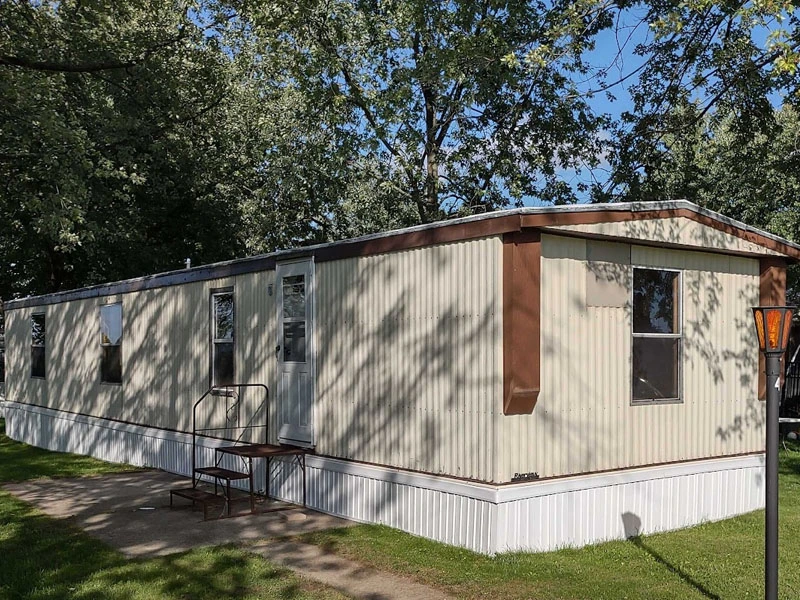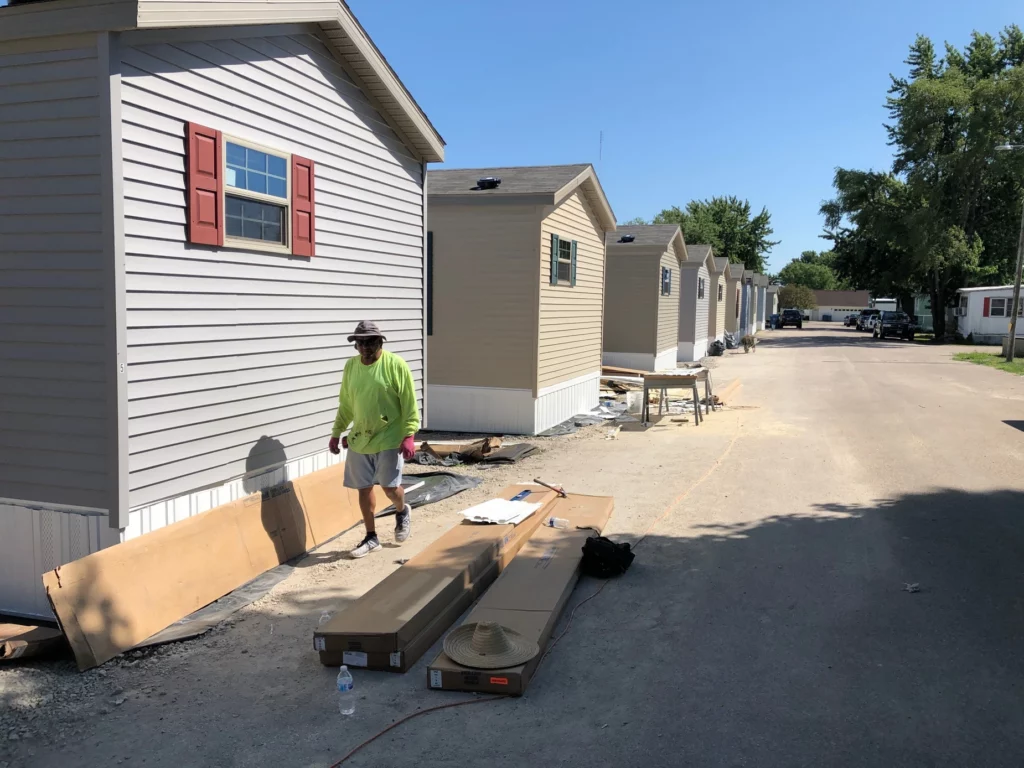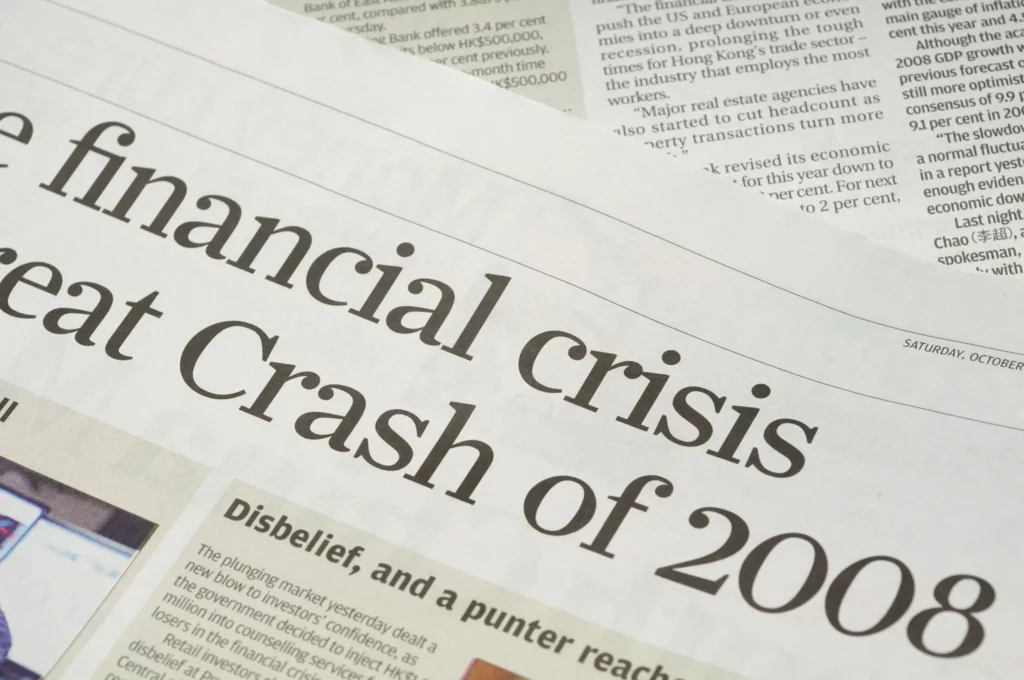Risks Typically Involved in Mobile Home Park Investments: A Comprehensive Study
-
 Tristan Hunter - Investor Relations
Tristan Hunter - Investor Relations
What are the typical risks associated with investing in mobile home parks?
Passively investing in mobile home parks has garnered attention as a potential avenue for generating good returns, but it’s essential to recognize that this venture is not void of risks. A comprehensive understanding of these risks is crucial for informed decision-making. In this article, we dive into the various potential risks associated with mobile home park investments. We also shed light on potential strategies to navigate them effectively.

Understanding the Risk Landscape in Mobile Home Park Investing
1. Market Volatility and Economic Uncertainty
Fluctuations in the broader economy may have the potential to substantially impact mobile home park tenants due to their low socio-economic status. Economic downturns may lead to decreased demand for all housing, potentially affecting occupancy rates and rental income. Navigating these uncertainties requires staying updated on economic indicators and developing contingency plans.
2. Regulatory and Zoning Complexities
Mobile home parks are typically subject to a labyrinth of zoning regulations and local ordinances. Zoning changes or regulatory shifts, like rent control, can potentially alter the feasibility of a mobile home park, impacting its value. Rigorous due diligence and proactive engagement with local authorities before purchase are essential to potentially preempt these challenges.
3. Fluctuating Demand and Occupancy
The demand for mobile home park housing can vary based on location and economic factors. Low demand can potentially lead to decreased occupancy rates, impacting cash flow. Thorough market analysis before making a purchase and an understanding of demographic trends can possibly aid in gauging potential demand shifts.
4. Property Management Challenges
Effective management is pivotal in maintaining the profitability of a mobile home park. Inefficient management may lead to tenant dissatisfaction, higher turnover rates, and increased maintenance costs. Collaborating with professional management teams has the potential ability to mitigate these challenges.
- Effective Tenant Relations: In the realm of mobile home park investing, nurturing positive relationships with tenants is pivotal. Responsive communication, addressing concerns promptly, and fostering a sense of community are examples that can potentially enhance tenant satisfaction and promote longer tenancies.

- Operational Efficiency: Streamlining operations through efficient management practices likely reduces costs and enhances overall profitability. Proper organization of maintenance schedules, rent collection, and administrative tasks aids in ensuring a smooth workflow.
- Regulatory Compliance: Mobile home park investing requires adherence to various regulations, including tenant rights and fair housing laws. Staying updated on legal requirements and ensuring compliance typically prevents legal disputes that could result in financial and reputational risks.
5. Tenant Quality and Turnover (Background checks)
The quality of tenants can significantly impact the financial health of a mobile home park. High turnover rates and difficulties in finding reliable tenants may disrupt cash flow and increase operational costs. Implementing stringent tenant screening processes can help mitigate these risks.
- Tenant Screening Protocols: Implementing tenant screening protocols can help identify reliable tenants who are likely to adhere to lease terms and contribute positively to the community. Thorough background checks, credit assessments, and rental history verification can potentially mitigate the risk of problematic tenants.
- Tenant Engagement and Communication: Establishing open lines of communication with tenants can foster a sense of community and encourage tenant satisfaction. Regularly addressing concerns, maintaining transparency, and promptly addressing maintenance requests can potentially reduce turnover by creating a more desirable living environment.
- Lease Agreement Flexibility: Crafting lease agreements with flexible terms that cater to tenant needs will likely encourage longer tenancies. Offering options such as extended lease durations or renewal incentives can possibly incentivize tenants to stay, minimizing turnover and associated costs.
6. Maintenance and Upkeep
Mobile home parks typically require regular maintenance to uphold their value and appeal. Neglecting maintenance can lead to depreciating property conditions and potential liabilities. Creating a robust maintenance plan and allocating resources accordingly is essential.
- Scheduled Maintenance Plans: Developing and adhering to scheduled maintenance plans aids in ensuring that the property remains in optimal condition. Regular inspections, repairs, and upkeep activities generally prevent minor issues from escalating into costly problems, thereby likely preserving property value and reducing potential liabilities.

- Responsive Management: Having a responsive property management team in place can address maintenance concerns promptly. Quick response times to maintenance requests and efficient handling of repairs contribute to tenant satisfaction and minimize disruptions.
- Capital Reserve Fund: Establishing a capital expenditure reserve fund allows for earmarked resources to cover major maintenance projects or unexpected repairs. This proactive approach usually safeguards against financial strain and will likely ensure that maintenance needs are met without compromising the mobile home park’s condition.
7. Economic Factors and Rent Control
There are economic conditions that hold a significant influence on the potential returns and risks associated with mobile home park investing. Economic fluctuations, such as inflation, can have far-reaching implications, extending beyond the surface-level impact on everyday expenses. Understanding how economic conditions intertwine with the operational dynamics of mobile home parks is crucial for prudent decision-making.
Impact of Economic Conditions
Economic conditions, encompassing factors like inflation rates and overall market health, can exert a pronounced effect on mobile home park investments. Inflation, the gradual rise in the general price level, can gradually erode the purchasing power of money. For mobile home park investors, inflation can translate into higher operating costs. Maintenance expenses, utility charges, and other operational outlays may experience upward pressure, thereby affecting the overall profitability of the investment.
Moreover, economic downturns can result in decreased demand for housing, including mobile homes. Reduced demand can potentially lead to lower occupancy rates, subsequently impacting the rental income generated from the mobile home park. Investors need to be attuned to economic indicators and trends to proactively strategize and navigate the challenges posed by economic fluctuations.

It’s important to note that in previous recessionary times (like during the 2008 Great Recession), mobile home parks have historically performed well, being the most affordable form of non-subsidized housing available. NOI growth stayed positive during the previous recessions.
Navigating Rent Control Regulations
Another layer of complexity in mobile home park investing is the presence of rent control regulations in certain jurisdictions. Rent control laws restrict the extent to which landlords can increase rent prices for tenants. While these regulations are often implemented to safeguard tenants from exorbitant rent hikes, they can have implications for the revenue streams of mobile home park investors.
Rent control regulations can limit an investor’s ability to adjust rents according to market conditions. This can become particularly pertinent during periods of economic growth when demand for housing surges and rental rates naturally follow suit. For mobile home park investors operating in regions with rent control laws, the ability to maximize rental income in response to increased demand is curtailed. Also, if inflation is higher than the rent control, it can limit your investment which could in turn encompass a negative real return. This is why it will likely be valuable to invest in red states away from rent control laws.
Learn more about mobile home park investing.
Interested in learning more about mobile home park investing? Get in touch with us today to find out more.
Staying Informed
In the realm of mobile home park investing, the ever-changing landscape of economic conditions and rent control regulations underscores the significance of staying informed. The diligent investor keeps a watchful eye on local economic trends, understanding how inflation may impact operating costs and tenant affordability. Simultaneously, they remain attuned to any alterations in rent control regulations that could impact the rental income potential of the investment.
Partnering with professionals who possess expertise in both the economic and legal dimensions of mobile home park investing, can potentially prove to be invaluable. Their insights and guidance can potentially aid investors in navigating these complex factors, formulating strategies to mitigate risks, and optimizing returns even in the face of economic uncertainties and regulatory constraints.
Potential Strategies for Mitigating Risks in Mobile Home Park Investing
1. Thorough Due Diligence
Conducting comprehensive due diligence usually involves scrutinizing market conditions, property histories, utility infrastructure, zoning regulations, and financial performance to list a few. Engaging professionals who specialize in real estate and legal matters, such as Keel Team, have the potential ability to provide valuable insights.
2. Diversification
Diversifying investments across multiple mobile home parks in different markets can help mitigate the impact of a downturn in a single property or market. This strategic approach not only has the potential to spread risk, but likely also allows investors to tap into various market dynamics and capitalize on emerging opportunities, which could in turn enhance the resilience of their investment portfolio. Additionally, diversification can provide a buffer against localized market fluctuations, enabling investors to potentially navigate challenges with greater stability and confidence.
3. Professional Property Management
Ensuring property management is handled by experienced professionals in the ownership group can enhance tenant satisfaction, reduce turnover, and streamline operations. This strategic vertical integration typically allows investors to focus on strategic decision-making and property growth, while skilled property managers handle day-to-day tasks, ensuring that the mobile home park is well-maintained, tenants’ needs are promptly addressed, and operational efficiency is optimized. As a result, investors can potentially enjoy peace of mind knowing that their investment is in capable hands, poised for long-term success. Currently, good third party property management in mobile home parks is hard to come by and there are few national players in this space.
Navigating the potential risks in mobile home park investments demands meticulous research, expert insights, and strategic planning. Keel Team stands ready to provide you with the guidance you need to help make informed mobile home park investment decisions. Contact us today to explore how our expertise will likely aid you in effectively managing the typical risks involved, and unlock the potential insights for a strong mobile home park investment on your portfolio.
4. Contingency Planning with your Financing & Debt
Developing contingency plans for economic downturns or regulatory changes can provide a roadmap for navigating uncertain times. These well-structured financing back up plans empower investors to respond swiftly and effectively, minimizing potential disruptions to cash flow and property value. However, proactively anticipating challenges and outlining actionable steps, investors may be better equipped to adapt to changing circumstances (like interest rate hikes) and potentially position their mobile home park investments for resilience and continued growth.
5. Local Expertise
Engaging with experts who possess local market knowledge and familiarity with zoning regulations can aid in making informed decisions. Additionally, these professionals not only provide valuable insights into property values and rental trends but also offer guidance on navigating the intricate legal landscape, likely ensuring that investors are well-prepared to address potential hurdles and capitalize on opportunities unique to each market. Their expertise can be a valuable asset in optimizing the potential of mobile home park investments while minimizing risks associated with unfamiliarity and regulatory complexities.
Learn more about mobile home park investing.
Interested in learning more about mobile home park investing? Get in touch with us today to find out more.
Wrapping It Up
Investing in mobile home parks, like any investment, involves potential risks that require careful consideration. By recognizing these risks and implementing proactive strategies, investors will likely work towards mitigating them and enhancing their chances of success. Thorough due diligence, professional guidance, and a comprehensive risk management approach can aid in paving the way for a rewarding journey in the realm of mobile home park investments.
Disclaimer:
The information provided is for informational purposes only and should not be considered investment advice, nor a guarantee of any kind. There are no guarantees of profitability, and all investment decisions should be made based on individual research and consultation with registered financial and legal professionals. We are not registered financial or legal professionals and do not provide personalized investment recommendations.

Tristan Hunter - Investor Relations
View The Previous or Next Post
Subscribe Below 👇





